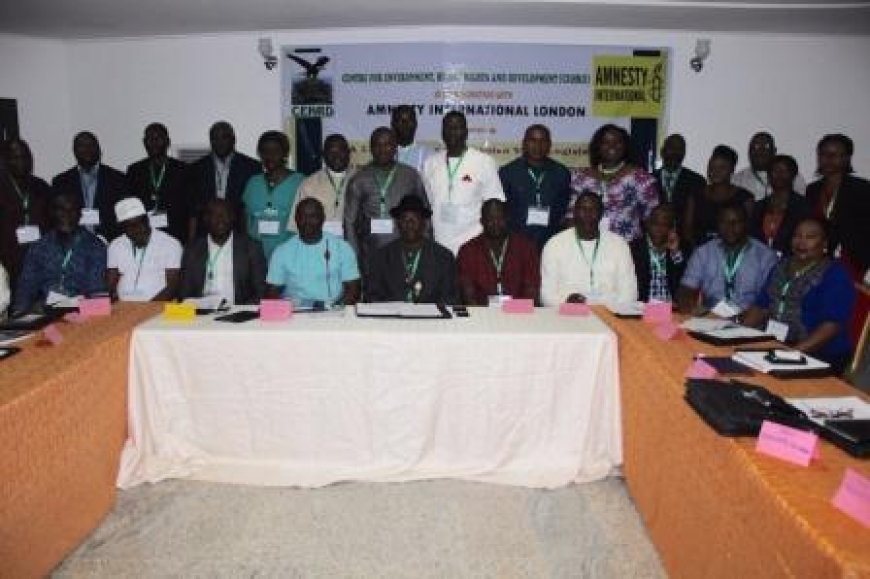CEHRD organised capacity building training for members of the Rivers and Bayelsa States Houses of Assembly. The capacity building training was designed to strengthen the capacity of State legislators on regulatory policies and best practice mechanisms that will enhance their work as representatives of constituencies of which local communities are part of and so look up to them to initiate the change process. Participants at the training includes: Elected members of the Rivers and Bayelsa States Houses of Assembly, Legislative Aids, Administrative staff from the two Houses of Assembly, Key Civil Society Partners of CEHRD, Resource Persons drawn from the civil society and academic institutions and the media.
The training programme held for two days respectively in each State and was implemented in collaboration with Amnesty International (AI) Nigeria.
Bayelsa State House of Assembly Key Resolutions
Participants resolved and demanded as follows:
- That regulatory agencies be empowered to end dependence on oil companies and there is urgent need to streamline the functions of the multiple regulatory agencies in the oil and gas sector to eliminate conflict of interests/functions which give oil companies lee way to continue degrading the environment, thereby defeating the purposes for which the agencies were created.
- That the constitution be amended to give state legislators oversight powers over activities of the oil companies operating in their domain in order to regulate their activities and protect their local environment.
- That Environmental Impact Assessment and other laws available for environmental protection should be diligently enforced. EIAs should be made transparent, participatory and accountable in accordance with the provisions of the laws governing them.
- That communities be enlightened on their environmental and human rights and responsibilities by government and civil society.
- That there should be an urgent and speedy passage of the Petroleum Industry Bill as a panacea for dousing the current spate of agitations in the oil producing communities.
- That there be sustained and continuous collaboration between legislators, as true representatives of the people and NGOs/Civil Society, especially, Centre for Environment Human Rights and Development (CEHRD), NACGOND and Amnesty International.
- That Bayelsa Legislators shall work towards a Regional Forum for Legislators from the Niger Delta to address the region’s peculiar environmental challenges.
- That regular capacity building for law makers to enhance their oversight abilities for the benefit of their constituents/constituencies be organised.
- That the Bayelsa State House of Assembly shall set up research and documentation desk to collate data on environmental and human rights abuses/violations.
- That Oil Companies dominant in the state be mandated to respect domestic laws and abide by international standards.
- That poverty, marginalisation and underdevelopment of the region be addressed as a more sustainable way of tackling the problem of insecurity rather than militarization.
Rivers State House of Assembly Key Resolutions
Participants resolved as follows:
- Empowering regulatory agencies to insulate them from over-dependence on the oil companies. In addition there is an urgent need to streamline the functions of the multiple regulatory agencies in the oil and gas sector in order to eliminate conflict of interest/functions which has allowed the oil companies the leeway to continue degrading the environment, thereby defeating the purposes for which the agencies were created.
- Amendment of the constitution to give states oversight over activities of the oil companies in other to regulate the activities of the oil companies and better protects the environment.
- Enforcing the Joint Investigation Visits, Environmental Impact Assessment, and other laws available for environmental protection. EIAs and JIVs should be made to be transparent, participatory and accountable in accordance with the provisions of the EIAs and JIVs.
- Renegotiating the Joint Venture agreements between the government and the oil companies to ensure that the government does not remain in a situation that it is being forced to regulate itself or to be a judge on its own matter.
- Urgent and speedy passage of the Petroleum Industry Bill as a panacea for dousing the current spate of agitations in the oil-producing communities.
- Sustained and continuous collaboration between legislators, as the true representatives of the people and NGOs/Civil Society, especially Centre for Environment, Human Rights and Development (CEHRD) and Amnesty International.
- Regular capacity building for lawmakers to enhance their lawmaking oversight functions for the benefit of their constituencies.

